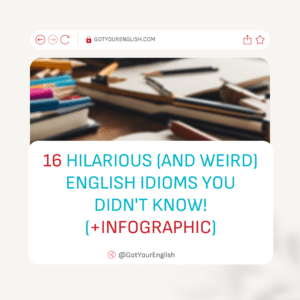
16 Hilarious (and Weird) English Idioms You Didn’t Know!
(Audio version of this post, audio has been generated from the text.)
You’ve been studying English for what seems like forever and you feel confident in your English skills. Perhaps you don’t even need subtitles anymore, even when you’re watching a particularly niche episode of How’s it made. But then you stumble upon an episode of a British TV show and suddenly you hear “What’s the craic?” and you feel like you’re hearing another language altogether.
The English language boasts a rich variety of funny (and slightly strange) idioms. Especially if you broaden your horizons ( 🙂 ) and explore some lesser-known hilarious English phrases, which are often regional or just not popularized through Hollywood productions. And movies are an invaluable source of English knowledge – who hasn’t learned at least a third of their vocabulary thanks to their favorite films or TV shows! I watched the latest Mission Impossible movie recently and Benji’s “Bob’s your uncle” admittedly took me out for a second. I had to think, did this mean that whatever he was explaining was straightforward?

“Bob’s your uncle” personified?
I felt the itch to google this idiom, just to double-check. I’ve heard it before but wasn’t sure of the meaning, so I had to reluctantly pause the incoming Tom Cruise stunt scene. The next thing I knew, I was reading about Scottish and Australian slang and idioms. I remember that when I was learning English, we barely covered the most widely used idioms and phrases and all our focus was on grammar. That’s amazing and all, but I feel like I’ve learned my fair share of idioms on my own throughout the years, from the media or during my interactions with native or near-native speakers, not at school.
While classroom skills are an excellent foundation when studying English, they may not be sufficient in real-world situations. According to researchers at the Industrial University of Tyumen in Russia, reading up on common slang words and idiomatic expressions can help students achieve their goals of effective and natural communication with native speakers.
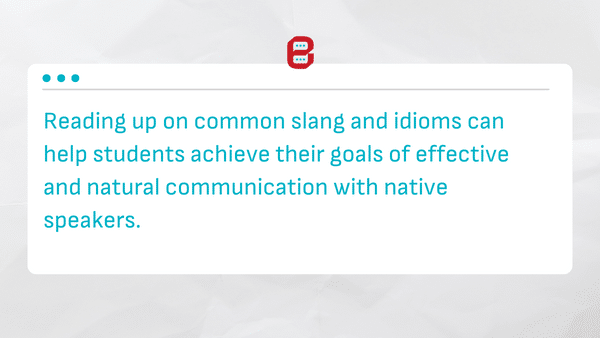
So, here I was, reading about how “Bob’s your uncle” probably originates from the appointment of the Chief Secretary for Ireland and how it corresponds with “Fanny’s your aunt”, that the idea for our first blog post on the site was born. Most advanced English students or those who have been learning the language for a long time already know the most common English slang phrases or idioms. I had a thought – what if I compiled all the strangest and the least known idioms (to English students, that is, not native speakers) that I could find? That would certainly be more interesting than reading the thousandth post about how to use “butterflies in my stomach” in a sentence.
I’ve been learning English my whole life and I didn’t know quite a few of those when I started my research. There is a sea of cool idioms out there, some region-specific, some more informal than others – but still, I hope fascinating to read! Please be advised that the list below contains mainly colloquial or informal idioms, but still, nothing offensive. 🙂
For those of you who learn the best visually, I’ve prepared a handy and colorful infographic. Do let us know what you think about it and what your favorite phrase is in the comments below!
Click on the Image Below to Download the Infographic! 
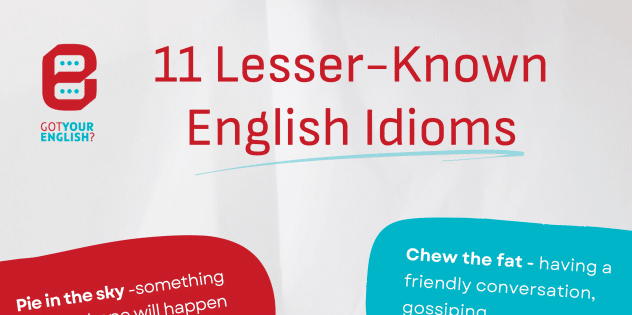
P.S.: About that “Bob” stuff, the phrase is commonly used in the United Kingdom and Commonwealth countries. “Bob’s your uncle” means “and there it is”, or “and there you have it”. Apparently, the Greek community in Australia also uses “Spiro is your uncle” when referring to nepotism. So far we have Bob, Fanny, and Spiro… but let’s continue to the full list of cool idioms below!
P.S.2: The list became GINORMOUS so I decided to split the post into two parts – more universally heard phrases and idioms (this post) and regional British and Australian slang, coming up in part two!
The 16 Funniest Lesser-Known English Idioms!
- Chew the fat – This means engaging in a friendly, leisurely conversation, often about trivial matters or gossip or to make small talk. It appears that it originated in the late 1800’s and referred to the grumbling of junior officers in the military.
Sentence example: We didn’t have much to do today at the office so we were just chewing the fat at lunch-time to avoid getting back to our desks.
2. Pie in the sky – this one makes me think of that animated movie, Cloudy with a Chance of Meatballs. This idiom means something that you hope will happen but is very unlikely to come true, wishful thinking.
Sentence example: The rumors that I was going to be the next manager turned out to just be pie in the sky.
3. The tail wagging the dog – when a big or powerful institution or person is being controlled by a lesser force; when a mighty entity is under the thumb of a much smaller and weaker player. Similar to David overpowering Goliath.
Sentence example: Ever since the owner’s teenage son started an internship here, the managers are always trying to please him. It’s like the tail wagging the dog.
4. Buy the farm – this means to die, especially during military action. This idiom originated in the US military and was first used in the early 20th century to mean being killed.
Sentence example: If this plane falls, the odds are we’ll all buy the farm.
5. (Strictly) for the birds – referring to something meaningless and worthless; not to be taken seriously, trivial, or for the gullible. It’s a piece of US Army jargon that first emerged towards the conclusion of World War II. Some sources suggest that its meaning was meant to convey a euphemism for “horses***”.
Sentence example: I’ve started following this cooking channel recently. They’ve got tasty recipes, but the idea that these meals are healthy for children is for the birds.
6. Send/bring/carry owls to Athens – еngaging in a task that is pointless or unnecessary. This phrase originates from Ancient Greece, specifically the city of Athens, where silver coins were minted featuring an owl (a common sight in the city). The owl was even the symbol of the city. Therefore, bringing owls to Athens would serve no purpose.
Sentence example: Trying to open up another beauty salon in this area is like sending owls to Athens, it’s not a good business idea.

These owls are prepared for their trip to Athens.
7. Throw the baby out with the bathwater – I find this darkly hilarious. It means losing valuable ideas or items while trying to eliminate unwanted ones – it’s a very memorable phrase!
Sentence example: Why are you scrapping the entire script? Don’t throw the baby out with the bathwater, it’s just this one section that needs more work, not the whole thing!
8. Upset the apple cart – to obstruct or sabotage someone’s plans or goals; derail a beneficial project; mess up the current situation or established order of things; to take actions that hinder the progress of something.
Sentence example: Don’t upset the apple cart by trying to meddle in their relationship troubles. You’ll only mess up the situation further.
9. Get someone’s goat – to greatly irritate someone or to cause annoyance or anger. Some claim this idiom stems from horse racing where people used goats to calm horses by placing them in a horse’s stall before the race. If someone removed the goat though, the horse would become agitated and nervous.
Sentence example: The way he tries to please everyone really gets my goat, he’s so fake!
10. Turn turtle – depicts a situation where something flips or turns upside down. Derived from maritime origins, this phrase refers to a turtle ending up on its back, which is a vulnerable position. Over time, the idiom has transformed to also symbolize situations that have taken a wrong turn or deviated unexpectedly from the original path.
Sentence example: The movie turned turtle after the scandal was uncovered by the media.
11. Everything but the kitchen sink – almost everything you can take, even unnecessary stuff. There’s a recorded usage of ‘everything but the stove’ in the late 1800’s, so maybe whoever came up with ‘the kitchen sink’ got inspired by that phrase.
Sentence example: When we went on vacation last month, I got carried away with my luggage and brought everything but the kitchen sink!
12. All mouth and no trousers (in the US: “all (or big) hat and no cattle”) – commonly used to depict people who speak extensively but fail or have no intention to back up their words with actions.
Sentence example: Her boyfriend is all mouth and no trousers; he’s promised to be more attentive for the last two years and he still hasn’t changed a bit!
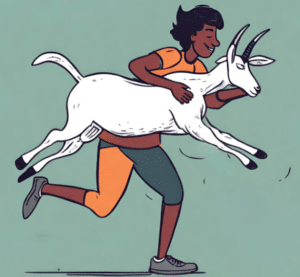
This really gets my goat.
13. Pull the wool over someone’s eyes – referring to the intention to deceive or misdirect someone, particularly to gain an advantage over the other person. This phrase could be referencing the tradition of wearing wigs in the past, where if the wig slipped down, it could temporarily blind someone.
Sentence example: His wife had pulled the wool over his eyes for years by maintaining an on-and-off relationship with her colleague.
14. Wet behind the ears – meaning being inexperienced, very young and a novice. The phrase is likely referring to how baby animals are cleaned by their mothers but they would remain wet behind their small ears for long after the ‘bath’.
Sentence example: I would be scared to undergo an operation with this doctor, he seems wet behind the ears.
15. Burn the candle at both ends – referring to when someone overworks themselves or puts in too much effort.
Sentence example: Their manager should prioritize one project over the other if he doesn’t want his team to burn the candle at both ends.
16. In the pink of health – commonly used to describe someone who is in great physical shape or good health. The saying finds its roots in the 16th century, when “pink” was used to signify the highest quality or the epitome of something.
Sentence example: Thank you for checking up on me! My pneumonia is gone and I’m now in the pink of health.
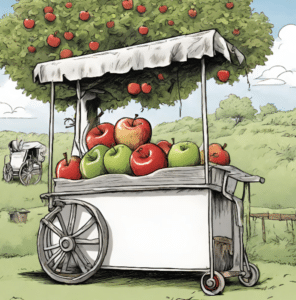
So don’t upset the apple cart and stay tuned for part two of this post – 40+ funny British idioms and slang phrases!
Drop us a comment below about your favorite English idiom!
Tags:How useful was this post?
Click on a star to rate it!
Average rating 4.3 / 5. Vote count: 15
No votes so far! Be the first to rate this post.
We are sorry that this post was not useful for you!
Let us improve this post!
Tell us how we can improve this post?


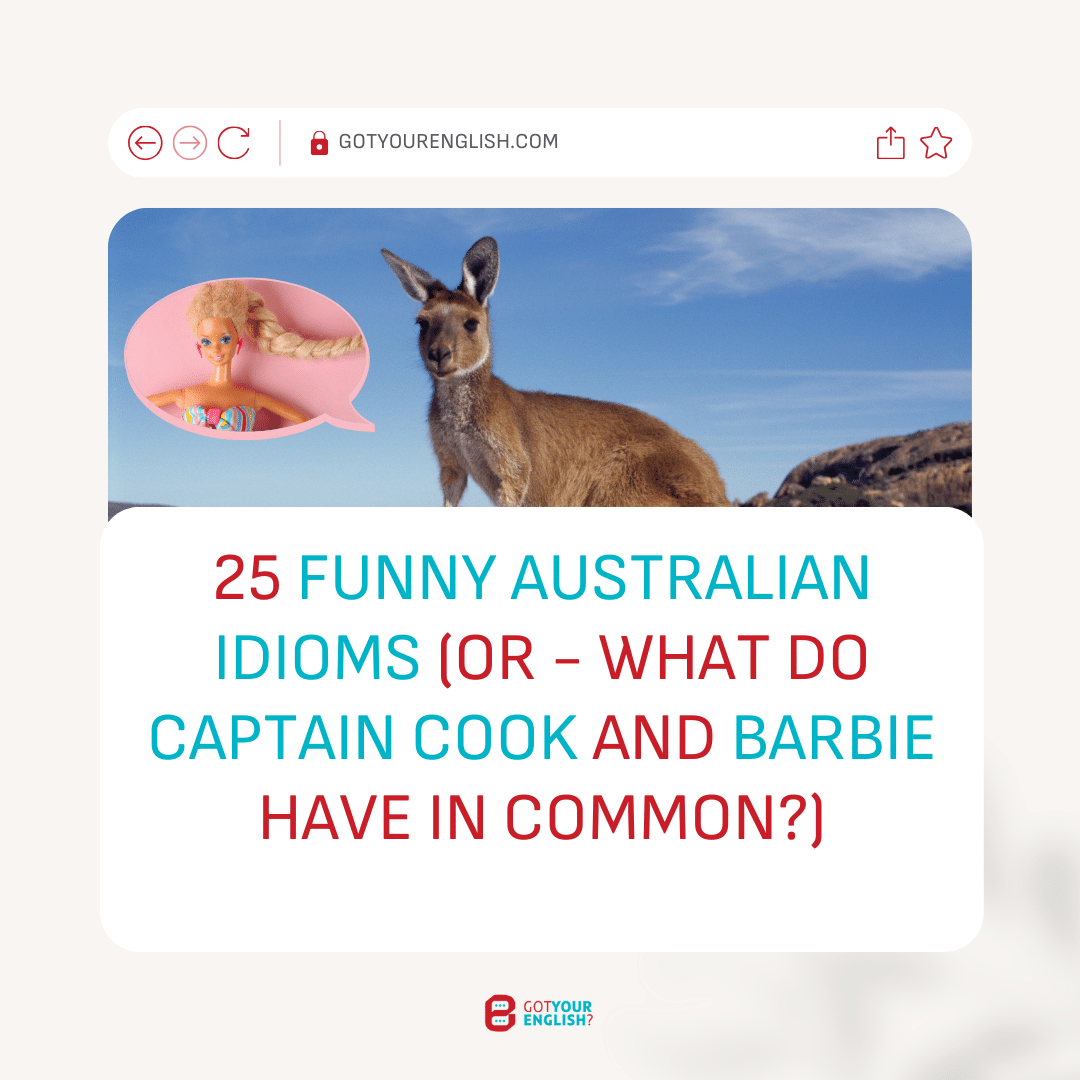


2 Responses